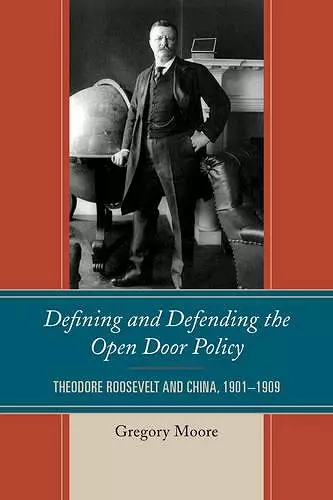Defining and Defending the Open Door Policy
Theodore Roosevelt and China, 1901–1909
Format:Paperback
Publisher:Lexington Books
Published:27th Mar '17
Currently unavailable, and unfortunately no date known when it will be back

There has been little examination of the China policy of the Theodore Roosevelt administration. Works dealing with the topic fall either into brief discussions in biographies of Roosevelt, general surveys of Sino-American relations, or studies of special topics, such as the Chinese exclusion issue, which encompass a portion of the Roosevelt years. Moreover, the subject has been overshadowed somewhat by studies of problems between Japan and the United States in this era. The goal of this study is to offer a more complete examination of the American relationship with China during Roosevelt’s presidency. The focus will be on the discussion of major issues and concerns in the relationship of the two nations from the time Roosevelt took office until he left, something that this book does for the first time. Greater emphasis needs to be placed on creating a more complete picture of Teddy Roosevelt and China relations, especially in regard to his and his advisers’ perceptual framework of that region and its impact upon the making of China policy. The goal of this study is to begin that process. Special attention is paid to the question of how Roosevelt and the members of his administration viewed China, as it is believed that their viewpoints, which were prejudicial, were very instrumental in how they chose to deal with China and the question of the Open Door. The emphasis on the role of stereotyping gives the book a particularly unique point of view. Readers will be made aware of the difficulties of making foreign policy under challenging conditions, but also of how the attitudes and perceptions of policymakers can shape the direction that those policies can take. A critical argument of the book is that a stereotyped perception of China and its people inhibited American policy responses toward the Chinese state in Roosevelt’s Administration. While Roosevelt’s attitudes regarding white supremacy have been discussed elsewhere, a fuller consideration of how his views affected the making of foreign policy, particularly China policy, is needed, especially now that Sino-American relations today are of great concern.
Moore unravels the complicated legacy of the history and evolution of the US Open Door Policy in China, 1901-9. Making extensive use of archival sources and noting how broader global events and challenges at home helped influence and shape US foreign policy objectives in Asia, Moore argues that Theodore Roosevelt's administration pursued reactive rather than proactive foreign policy objectives in Asia. Given the limited US presence in China, Roosevelt pragmatically championed equal commercial opportunity in China while paying lip service to preserving China's territorial integrity. Recognizing Japanese interests in the region, the Roosevelt administration adapted the Open Door Policy to cultivate Japan as a buffer to check Russian ambitions in the region, thereby minimizing the risk of US military intervention. Moore concludes that the Roosevelt administration, though pragmatic, dealt with China from a limited, stereotyped point of view that failed to perceive the revolutionary forces and sentiments that were surfacing there. As a result, policymakers' appreciation of events taking place during the waning years of the Qing Dynasty was limited, and hindered the development of a more proactive foreign policy. Summing Up: Recommended. Most levels/libraries. * CHOICE *
Where the book makes its most significant contribution is on the Taft-Katsura memo and Root-Takahira agreement. Moore does well exhibiting the historiographical debates over the informal/formal nature of the Taft-Katsura memo. He provides a contextualized and balanced view of the American-Japanese relations, and illustrates the diplomacy of Root in 1908 with State Department sources that add to our knowledge of the Takahira agreement. . . .Defining and Defending the Open Door Policy…demonstrates the chaos of geopolitics and how local, seemingly unimportant, events shape policy. * Reviews in History *
Divided into an introduction, seven chapters, and a conclusion, this monograph fills an important gap in our understanding of Roosevelt's support, and in some unfortunate ways lack of support, for the Open Door Policy. * Pacific Historical Review *
Professor Moore has been successful in illuminating two "foreign" cultures—China and US foreign policy making—which are often poorly understood by outsiders. Although the events he discusses happened more than a century ago, the issues covered are still having an impact today in both cultures. -- Timothy R. Walton, associate professor of Intelligence Analysis at James Madison University, retired CIA officer
Gregory Moore has produced a study of the geopolitics of America's 'Open Door' policy towards China that is as rich in historical detail as it is important for contemporary thinking about American foreign policy. The book's conclusions about how the United States frequently does not adequately understand the cultures it is dealing with in its foreign policy is an ongoing lesson that contemporary decision-makers need to heed. This book is a must read, not only for students of U.S. foreign policy and Asian international history; it also will be a vital resource for contemporary policymakers seeking to understand the historical trends which shape today's international environment. -- Sean Kay, Robson Professor of Politics and Government, Ohio Wesleyan University
Professor Gregory Moore adds welcome detail to our knowledge of President Theodore Roosevelt’s approach to the China question from 1901 to 1909. Drawing on archival evidence, his book brings together generations of scholarship in the English speaking world on how Roosevelt shaped America’s Open Door policy during the last years of the Qing. -- Dong Wang, Research Associate, Fairbank Center of Harvard University
ISBN: 9780739199978
Dimensions: 231mm x 150mm x 19mm
Weight: 376g
252 pages